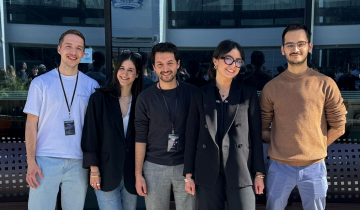Maxime LIEGEY will defend his thesis on "Essays in Firm Dynamics and Labor Market" on Wednesday 6 september 2017, 16:00, Room MF 323.
Director: Thomas Chaney,TSE associate faculty, UT Capitole
Memberships are:
Christian HELLWIG, TSE researcher, Université Toulouse 1 Capitole
Martí MESTIERI, professor, Northwestern University
Gilles SAINT-PAUL, professor, Paris School of Economics
Abstract:
In the first chapter, I explore how firms' internal workings can interact with competition on the labor market, to shape firm dynamics as well as the assignment among heterogeneous agents. I develop a theoretical model, where managers team up with workers, supervising them working on projects, using knowledge to solve problems that threaten to interrupt ongoing projects. Search frictions imply that it takes time to replace interrupted projects with new hires, so that managers have an incentive to use their own knowledge, to try and reactivate projects internally. Managers' attention span is in scarce supply, though, which creates a trade-off between hoarding interrupted projects to try to reactivate them, on the one hand, and churning workers on the other, that is, replacing interrupted projects with new hires. I show that formalizing such an output process, instead of using a conventional production function, in an otherwise standard search-and-matching model, allows to account for the large empirical dispersion in firm-level correlations between wage, productivity, size, output, and growth.
The second chapter studies the impact of the increase in French imports from China, following the latter's accession to the WTO in 2001, on the French labor market. We use matched employer-employee data to gauge this effect at the individual worker's level, over the period 2001-2006, and to explore how the adjustment operates along distinct margins. We document a differential impact on French workers, depending on their initial earnings: while workers in the bottom earnings tercile are negatively affected, the impact on workers in the top tercile is negligible. We show that the negative impact on the bottom tercile is at play in terms of hours workers, and not in terms of the wage rate, as these workers had to switch employers more often, with less hours worked on each contract. Such involuntary transitions often mean changing occupation, while remaining in the same impacted industry.
The third chapter deals with the impact of outsourcing on the distribution of wages. It is worth distinguishing between three types of outsourcing: 1) using temporary workers, 2) outsourcing tasks which are part of a wider production chain and 3) outsourcing non-core or non-specific tasks. I show on French firm-level data that the effects of these three types, on wages in outsourcing firms, while being qualitatively similar along some dimensions, they do not coincide. I focus my theoretical analysis on the third type of outsourcing, building upon Goldschmidt and Schmieder (2017), who show on administrative data that working for a service provider imply a cut of 10-15% in wages, relative to the same job as previously performed within the firm outsourcing non-core activities. I develop a search-and-matching model with firms employing two types of labor input, high-skillled and low-skilled, which can also contract out low-skilled tasks to a monopolistic service provider. I show that contracting out these tasks means a decrease in wages for the low-skilled workers, while having an ambiguous impact on high-skilled workers' wages.



